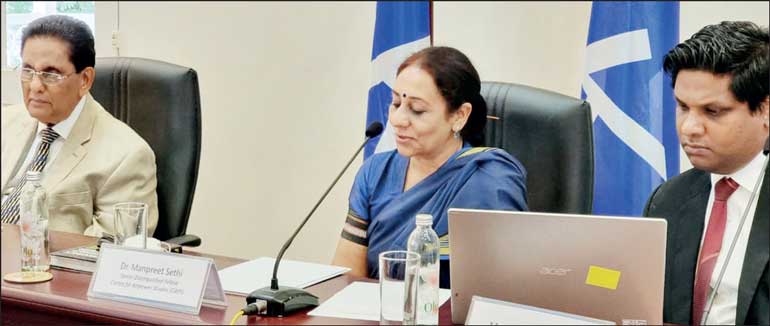Thursday Feb 19, 2026
Thursday Feb 19, 2026
Friday, 18 March 2022 00:00 - - {{hitsCtrl.values.hits}}

From left: Dr. Dayantha Laksiri Mendis, Dr. Manpreet Sethi and Malinda Meegoda

The Lakshman Kadirgamar Institute of International Relations and Strategic Studies (LKI) hosted a webinar on “Prospects for Managing Risk in Nuclear South Asia” on 14 March.
This webinar aimed to identify how current engagement efforts can be enhanced to better manage nuclear risks among the nuclear weapons states (NWS) in the region. In addition, the webinar explored how non-nuclear weapon states like Sri Lanka, can play a role in non-proliferation and disarmament efforts at regional and global level.
LKI Executive Director Dr. Dayantha Laksiri Mendis delivered the introductory remarks. The webinar featured former Ambassador and Permanent Representative of Sri Lanka to the United Nations in Geneva Ambassador A.L.A. Azeez, Centre for Airpower Studies (CAPS) Senior Distinguished Fellow Dr. Manpreet Sethi and Nuclear Policy Program at the Carnegie Endowment for International Peace Senior Fellow Dr. Tong Zhao.
In Ambassador Azeez’s presentation, he highlighted the contribution Sri Lanka has made in the realm of global nuclear non-proliferation and disarmament efforts. Specifically, Ambassador Azeez pointed out the efforts of Ambassador Jayantha Dhanapala and Justice Christopher Weeramantry in advancing normative and legal frameworks on nuclear weapons.
Dr. Sethi provided a comprehensive overview of the region’s nuclear challenges and detailed the strategic rationale behind India’s nuclear doctrine. Dr. Sethi also emphasised the need for greater awareness of the potential effects of the use of nuclear weapons even among non-nuclear weapon states such as Sri Lanka.
Dr. Zhao, in his analysis detailed China’s nuclear modernisation drive and how great-power politics and geo-strategic competition is fuelling such activities. All three panellists highlighted the dangers of the entanglement of non-nuclear with nuclear capabilities including emerging technologies such as cyber warfare.
The subsequent discussion moderated by LKI Research Associate Malinda Meegoda, focused on the importance of both China and India maintaining their nuclear ‘No first use’ policy, the sustainability and the future of the Treaty on the Non-Proliferation of Nuclear Weapons (NPT) and the merits and shortcomings of the Treaty on the Prohibition of Nuclear Weapons (TPNW).